The exact number and details of Google Ranking Factors are a closely guarded secret.
There are estimated to be over 200 factors, and the specific weight of each factor can change over time.
You might already know that Google uses over 200 ranking factors in their algorithm…
But what are they, exactly?
Well, you’re in for a treat because I’ve put together a complete list.
- On-Page SEO (Content & Structure):
- Off-Page SEO (Backlinks & Authority):
- User Experience (UX):
- Technical SEO :
- Content & Expertise:
- Local SEO (for Local Businesses):
- Mobile-Specific Factors:
- Security & Spam:
- Personalization & User Signals:
- Other Potential Factors:
- User Search Intent :
- Content Specific Factors:
However, here are some of the confirmed and widely believed to be important factors:
On-Page SEO factors (Content and Website Structure):
- High-quality, informative, and relevant content targeting keywords
- Title tags, meta descriptions, and headings optimized with keywords
- Mobile-friendly website design and fast loading speed
- Secure website with HTTPS encryption
- Proper internal linking structure for website navigation
- Image optimization with relevant alt tags
Off-Page SEO factors (Website Authority and Backlinks):
- Backlinks from high-authority websites in your niche
- Brand mentions and positive online reputation
- Social media presence and engagement
User Experience (UX) factors:
- Time spent on website (indicates user engagement)
- Bounce rate (percentage of visitors leaving after one page)
- Click-through rate (CTR) in search results
Technical SEO factors:
- Structured data markup for rich search results
- Core Web Vitals (website speed, responsiveness, and visual stability)
What are the most Important Google Ranking Factors?
High-quality, informative content that targets relevant keywords and provides a positive user experience is consistently important. Backlinks from high-authority websites and mobile-friendliness are also crucial factors.
Other potential factors:
- Location (for local searches)
- Freshness of content
- Content variety (text, images, videos)
- User demographics and search history (personalized results)
The best approach is to create valuable and informative content that provides a positive user experience.
As you focus on these core principles, your website will naturally improve its ranking in search results.
Now Let’s Dive into more details
On-Page SEO (Content & Structure):
- Content Quality & Depth: Informative, fresh, trustworthy content addressing user intent.
2. Keyword Targeting: Strategic use of relevant keywords throughout content.
3. Title Tag & Meta Description Optimization: Titles and descriptions that accurately reflect content and include target keywords.
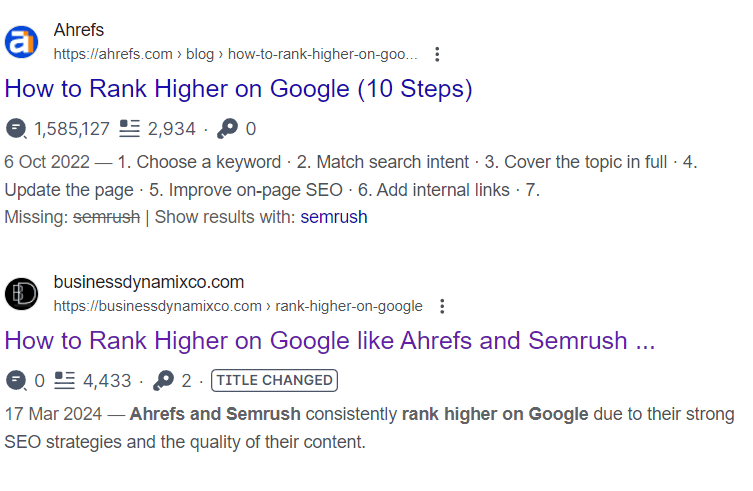
- Headings & Subheadings: Use of clear H1, H2, etc. tags with relevant keywords.
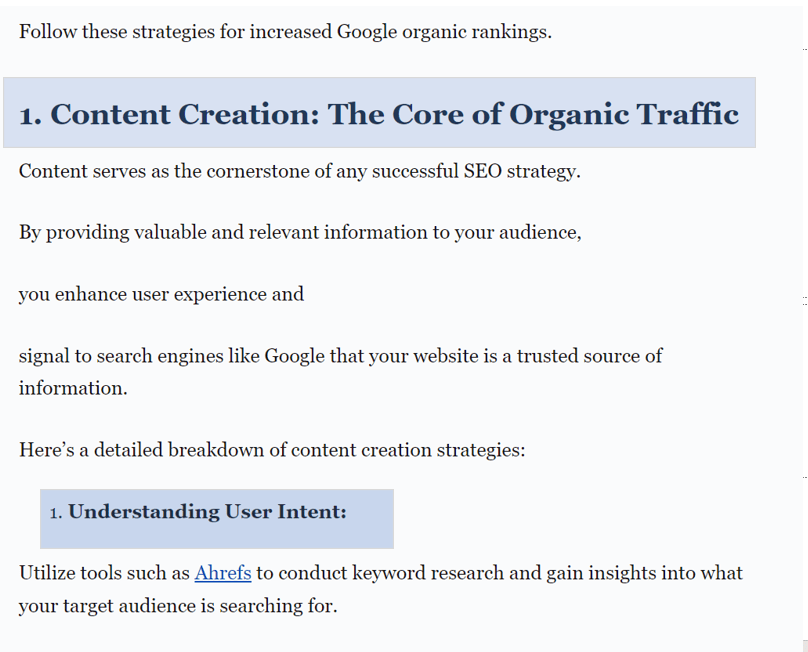
- Content Readability: Content written in a clear, concise style for the target audience.
6. Content Formatting: Use of bullet points, numbered lists, images, videos to improve readability.
7. Internal Linking: Linking to relevant internal pages to improve website structure and user navigation.
8. Image Optimization: High-quality images with relevant alt tags and file names.
9. Mobile-Friendliness: Responsive design that ensures optimal viewing on all devices.
10. Website Speed: Fast loading times for a positive user experience.
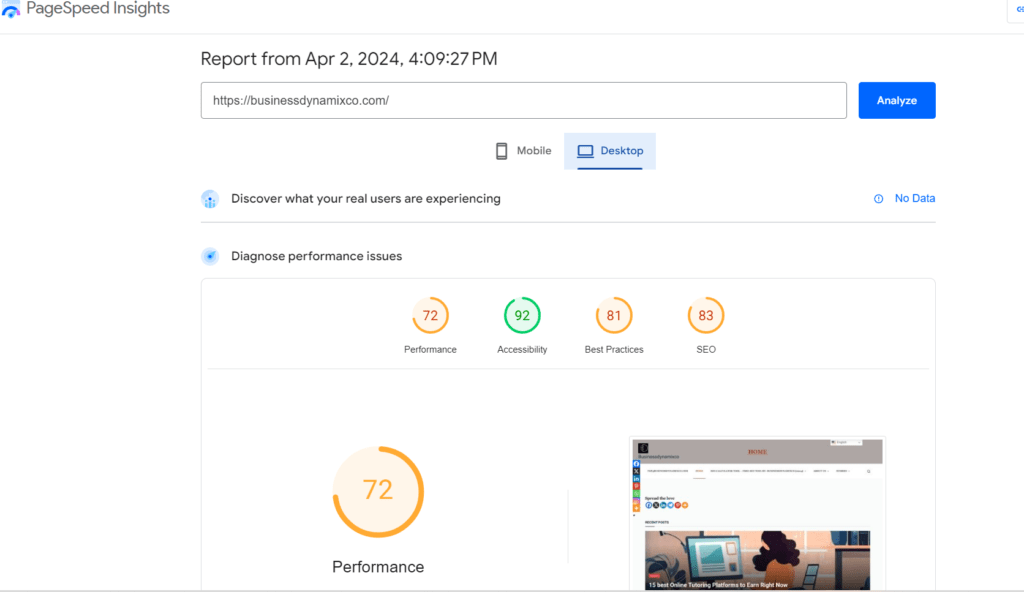
- HTTPS Security: Secure website with a valid SSL certificate.
- Structured Data Markup: Providing search engines with additional information about your content.
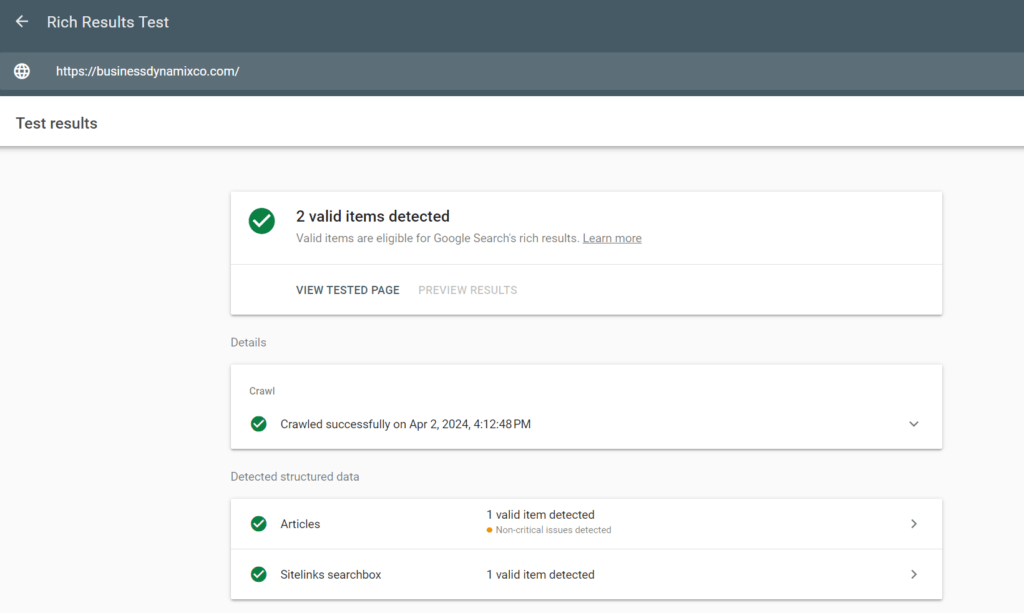
- Duplicate Content: Avoiding duplicate content within your website.
- Mobile Interstitials: Minimizing intrusive popups or ads on mobile.
- Core Web Vitals: Fulfilling Google’s standards for page load speed, interactivity, and visual stability.
- Breadcrumb Navigation: User-friendly navigation path for visitors.
- Table of Contents: Improved navigation for lengthy content.
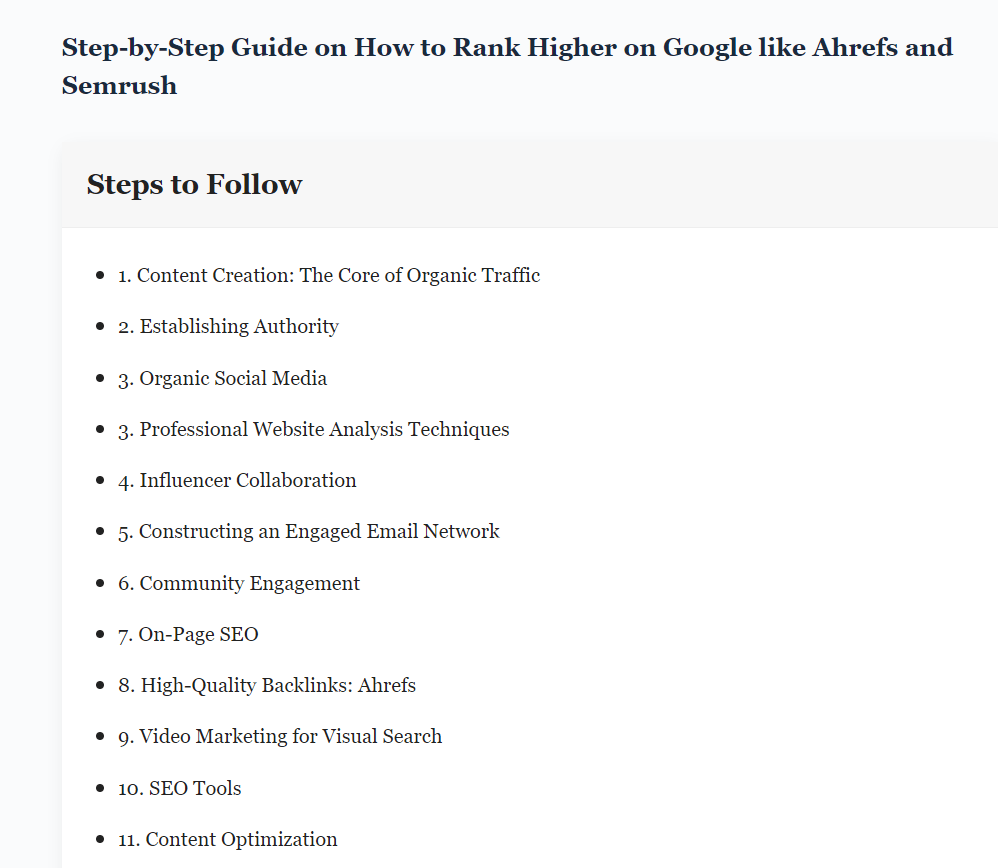
- Broken Link Fixing: Regularly checking and fixing broken links.
- URL Structure: Descriptive and user-friendly URLs with relevant keywords.
- Website Age & History: Established websites with a positive track record may rank higher.
What can I do to improve my website’s ranking?
Focus on creating valuable content: Write informative, engaging content that solves your audience’s problems.
Target relevant keywords: Research keywords people search for and incorporate them naturally throughout your content.
Off-Page SEO (Backlinks & Authority):
- Backlink Quality: Backlinks from high-authority, relevant websites in your niche.
- Backlink Quantity: The total number of backlinks pointing to your website (but quality matters more).
- Backlink Anchor Text: The text used to link to your website (containing relevant keywords is beneficial).
- Brand Mentions: Positive mentions of your brand online, even without backlinks.
- Social Media Engagement: Active social media presence with high engagement on your content.
- Social Shares: The number of times your content is shared on social media platforms.
- Brand Awareness & Reputation: Overall online reputation and brand recognition.
- Online Reviews & Ratings: Positive reviews and ratings from customers on relevant platforms.

- Guest Blogging: Contributing high-quality content to reputable websites in your niche (often with backlinks).
- Forum Participation: Actively engaging in relevant online forums and communities.
- Broken Backlink Building: Finding and replacing broken backlinks on other websites with links to your content.
- HARO Participation: Helping a Reporter Out (HARO) to build relationships with journalists.
- Offline Mentions: Mentions of your brand in print media or other offline sources.
Is there a shortcut to getting ranked higher?
“Unfortunately, there’s no magic bullet”. SEO is an ongoing process that requires consistent effort. Black hat SEO tactics (like keyword stuffing) might offer a temporary boost but can lead to penalties from Google in the long run.
User Experience (UX):
- Time Spent on Website: Longer time spent indicates user engagement with your content.
- Bounce Rate: Lower bounce rate signifies visitors finding your content valuable.
- Pages per Session: Users visiting multiple pages on your website during a visit.
- Click-Through Rate (CTR): The percentage of users clicking on your search result listing.
- Dwell Time: The amount of time users spend on a page after clicking from search results.
- Return Visitors: Users coming back to your website after an initial visit.
- User Satisfaction Surveys: Conducting surveys to understand user experience and preferences.
- User-Friendly Design: Easy-to-navigate website with clear calls to action.
- Accessibility: Ensuring your website is accessible to users with disabilities.
- Website Layout & Design: Visually appealing and user-friendly website design.
- Engaging Content: Content that keeps users interested and coming back for more.
- Interactive Content: Incorporating interactive elements like quizzes, polls, or calculators.
To know more read this, How to Create an Interactive posts
- Absence of Intrusive Ads: Avoiding overwhelming users with excessive or disruptive ads.
- Multilingual Support: Catering to a wider audience by offering content in multiple languages.
How long does it take to see results from SEO efforts?
It depends on various factors like competition, website age, and content quality. Generally, SEO is a long-term strategy, and it can take several months to see significant ranking improvements.
Technical SEO :
- Mobile Usability: Ensuring a flawless user experience on mobile devices.
- AMP (Accelerated Mobile Pages): Implementation of AMP for faster mobile loading.

- txt & Sitemap: Proper configuration of robots.txt and sitemap for search engine crawlers.
- Schema Markup: Using schema markup to provide richer search results.

- Structured Data Testing Tool: Utilizing Google’s Structured Data Testing Tool to validate implementation.
- Internationalization (i18n) & Localization (l10n): Optimizing for international audiences with language and cultural considerations.
Should I focus on getting ranked for local searches?
If you have a local business, absolutely! Optimize your Google My Business profile, build local citations, and create content targeting local keywords to improve your visibility in local search results.
Content & Expertise:
- Content Freshness: Regularly updating content with new information and insights.
- Content Comprehensiveness: Providing in-depth coverage of topics relevant to your audience.
- Entity-Based SEO: Optimizing content around relevant entities and concepts.
- Expertise, Authoritativeness, & Trustworthiness (E-A-T): Establishing yourself as an authority in your field through high-quality content and expertise.
- YMYL Compliance (Your Money or Your Life): Following stricter guidelines for websites in health, finance, and other sensitive topics.
- Content Variety: Offering a variety of content formats like text, images, infographics, and videos.
- Content Uniqueness: Creating original and valuable content that stands out from the competition.
Are there any SEO tools that can help me improve my ranking?
Yes! Several SEO tools can help you with keyword research, competitor analysis, backlink monitoring, and technical SEO audits. Some popular options include Google Search Console, SEMrush, Ahrefs, and Moz.
Local SEO (for Local Businesses):
- Google My Business Listing: Claiming and optimizing your Google My Business profile.
- NAP Consistency (Name, Address, Phone Number): Ensuring consistent NAP information across online directories.
- Local Citations: Building citations (mentions of your business name and address) on local directories and websites.
- Positive Online Reviews: Encouraging customers to leave positive reviews on Google My Business and other platforms.
- Local Content Creation: Creating content that targets local keywords and addresses local needs.
- Local Events & Sponsorships: Participating in local events and sponsoring local causes.
Mobile-Specific Factors:
- Mobile Page Speed: Fast loading times specifically optimized for mobile devices.
- Mobile-Friendly Clickable Elements: Buttons, links, and other elements easy to click on mobile screens.
- Interstitials on Mobile: Avoiding intrusive popups that disrupt the mobile user experience.
- Use of Accelerated Mobile Pages (AMP): Leveraging AMP for faster mobile loading.
Should I hire an SEO expert?
An SEO expert can provide valuable guidance and expertise to help you develop and implement a successful SEO strategy. This can be especially beneficial if you have a complex website or a competitive niche.
Security & Spam:
- HTTPS Security: A secure website with a valid SSL certificate.
- Mobile Security: Ensuring a secure website experience on mobile devices.
- Malware-Free: Keeping your website free of malware and malicious content.
- Avoiding Black Hat SEO Techniques: Focusing on white-hat SEO practices to avoid penalties from Google.
- High-Quality Backlinks: Avoiding low-quality or spammy backlinks.
- Internal Link Quality: Using relevant and valuable internal links.
Personalization & User Signals:
- Search History: Tailoring search results based on a user’s past search history.
- Location: Personalizing search results based on the user’s location.
- User Demographics: Potentially considering user demographics for personalization (unconfirmed).
Is SEO the only way to get traffic to my website?
No! There are many other ways to drive traffic to your website, such as social media marketing, email marketing, and online advertising.
Other Potential Factors:
- Website Age & History: Established websites may have an advantage.
- Content Updates & Frequency: Regularly updating content can improve rankings.
- Outbound Links: Linking to high-quality external sources can add value to your content.
- User Engagement Signals: Social media shares, comments, and other engagement metrics may be considered.
- Video Content: High-quality video content can be a ranking factor.
- Freshness of Backlinks: Newer backlinks may hold more weight than older ones (unconfirmed).
- Domain Name Branding: Branding elements within the domain name might be a factor (unconfirmed).
- User Reviews & Ratings: Positive user reviews and ratings can boost rankings.
- Social Media Followers: A large and engaged social media following may be a positive signal (unconfirmed).
- Website Awards & Recognition: Industry awards or recognition may play a role (unconfirmed).
- PageRank (speculative): While Google downplays PageRank’s importance, it might still be a factor.
What’s the best way to stay updated on the latest SEO trends?
Follow reputable SEO blogs, attend industry webinars, and connect with other SEO professionals. Google itself publishes updates and resources for webmasters, so keep an eye on their official channels.
User Search Intent :
- User Search Intent: Matching your content to the user’s specific intent behind their search query.
- Entity Search: How well your content aligns with search queries about specific entities (people, places, things).
Content Specific Factors:
- Link Location on Page: Where a link appears on a page is important. Generally, a link embedded in a page’s content is more powerful than a link in the footer or sidebar area.
- Linking Domain Relevancy: A link from a site in a similar niche is significantly more powerful than a link from a completely unrelated site.
- Page-Level Relevancy: A link from a relevant page also passes more value.
- Keyword in Title: Google gives extra love to links from pages that contain your page’s keyword in the title (“Experts linking to experts”.)
- Positive Link Velocity: A site with positive link velocity usually gets SERP boosts as it shows your site is increasing in popularity.
- Internal Linking Structure: A well-organized internal linking structure for efficient website navigation.
- Website Architecture: The overall structure and organization of your website’s content.
- Error Handling (404 Pages): Creating user-friendly 404 pages for broken links.
- Mobile User Experience (MUX): A set of metrics that measure user experience on mobile devices.
Remember, SEO is all about providing a valuable experience for users and search engines alike.
By focusing on high-quality content, user experience, and best practices,
you can improve your website’s ranking and visibility in the long run.
Now I’d like to hear from you:
Which SEO ranking factor from this list was new to you?
Or maybe I missed something.
Either way, let me know by leaving a comment below.

Founder of Businessdynamixco.com and top3s.businessdynamixco.com.
Website Builder, Growth Hacker, always get Excited in writing Articles with my little Experience !







I like it when folks get together and share thoughts.
Great site, continue the good work!